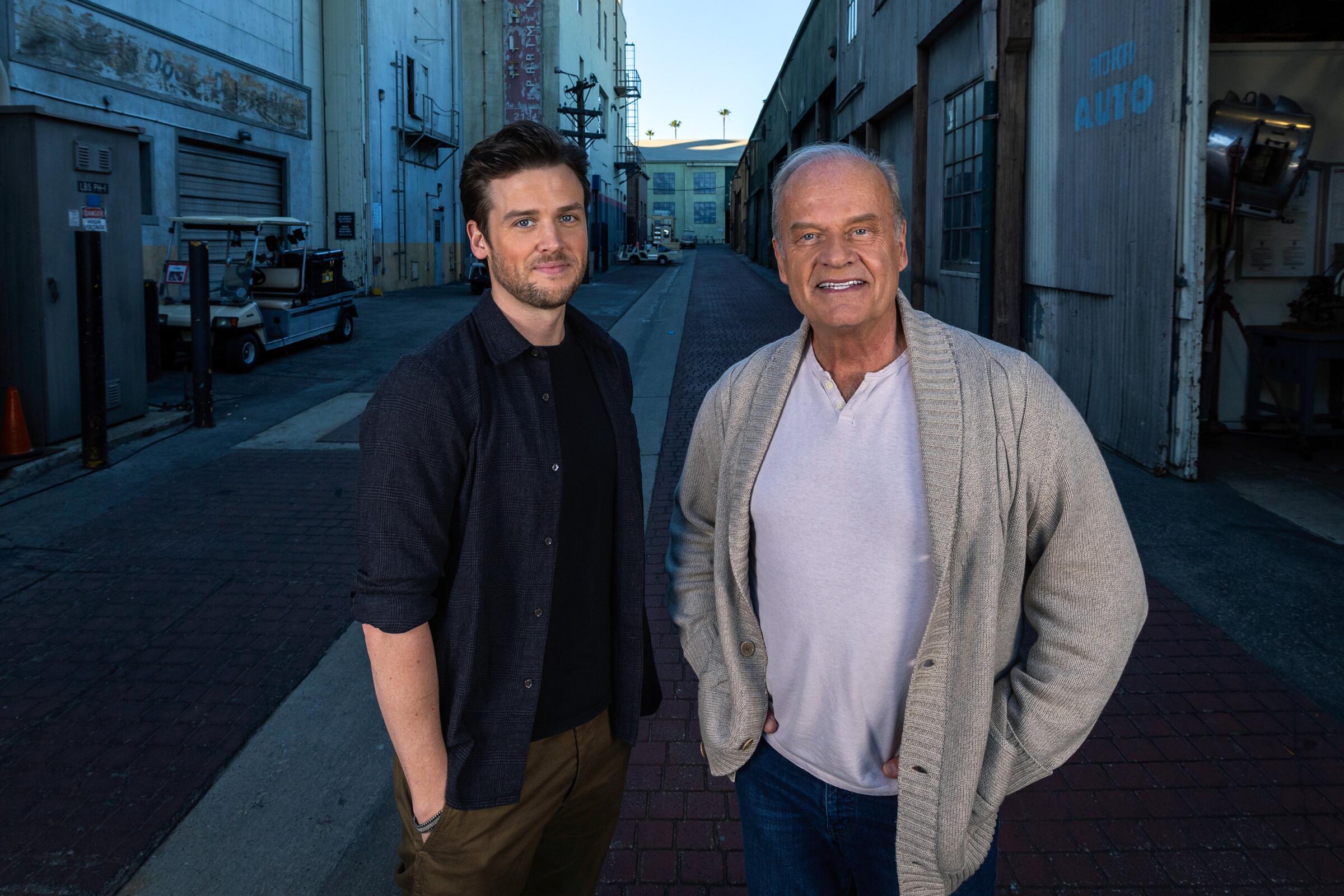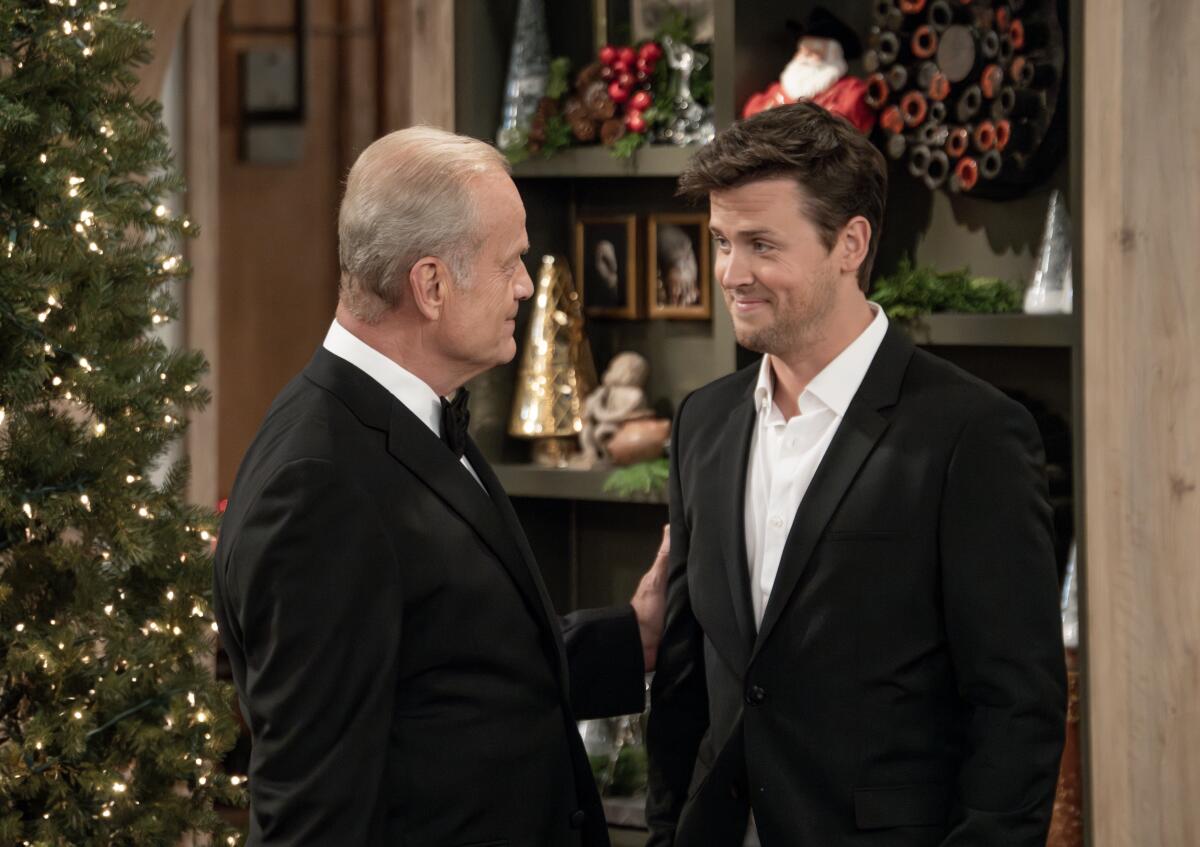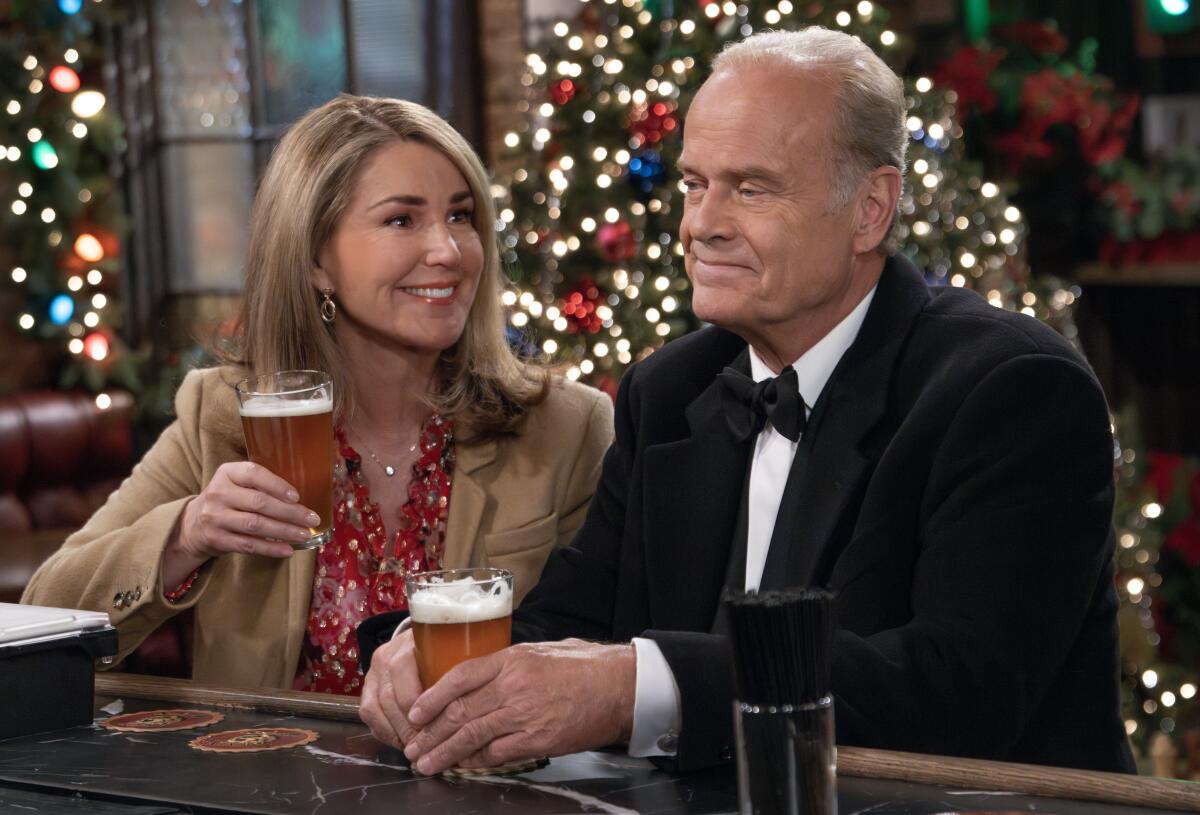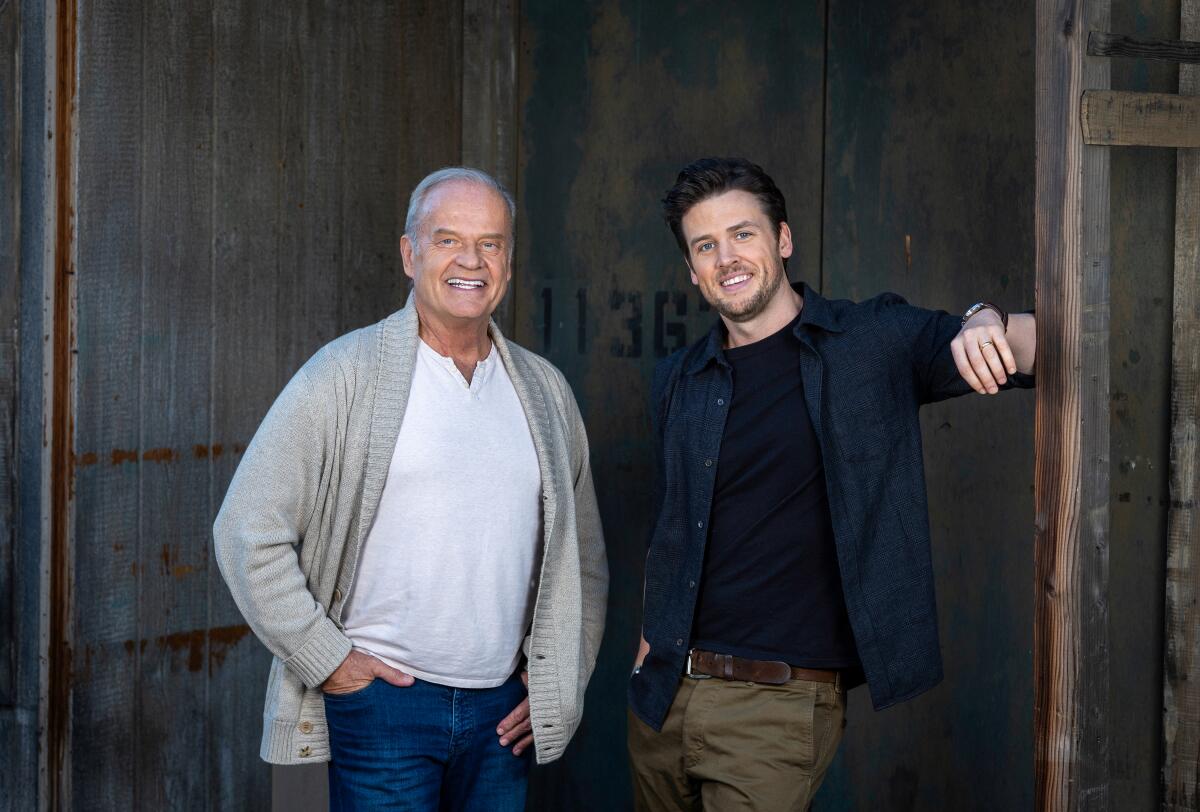The complete guide to home viewing
Get Screen Gab for everything about the TV shows and streaming movies everyone’s talking about.
You may occasionally receive promotional content from the Los Angeles Times.

Therapists have a saying that if it’s not one thing, it’s the mother.
But what about the father?
That was usually the case for Frasier Crane, the psychiatrist Kelsey Grammer inhabited first on the NBC series “Cheers” and then on his own much-lauded sitcom. On “Frasier,” which ran from 1993 to 2004 on NBC, Frasier and his brother and fellow analyst, Niles (David Hyde Pierce) were often at odds with their dad, Marty (John Mahoney), a working-class former Seattle Police Department detective. It didn’t help much that Marty not only lived with Frasier but came with some of his own accessories: a La-Z-Boy that didn’t match his son’s aesthetic, a Jack Russell named Eddie who became Frasier’s mortal enemy, and a nurse, Daphne (Jane Leeves), who transfixed Niles.
In the latest incarnation of “Frasier,” which aired its season finale Dec. 7 on Paramount+, Grammer’s metronomic-voiced hero returns to the “Cheers” setting of Boston, where he almost immediately moves in with his now-adult son Freddy (Jack Cutmore-Scott) by making the 30-something Harvard dropout-turned-firefighter an offer he can’t refuse: a free place to live.
Is the new ‘Frasier,’ premiering Thursday on Paramount+, as good as the old “Frasier”? So far, it stacks up well, our critic writes.
And while The Times couldn’t get any actual Freudians to analyze what it means that Frasier has foisted the mid-life he fought so hard against for himself onto his son, we did get the next best things: Grammer and Cutmore-Scott joined us for an interview on the Paramount Studios production lot, where the series is filmed, to discuss the season finale, the pressure this show has had to live up to its predecessor and more. This interview has been edited for clarity.

There are probably many analysts who have mimed the way they speak in therapy sessions to sound like you, Kelsey.
Grammer: Many people come up and say, “I’m a therapist, and I became one because of you.” I still wonder what the hell they were thinking. I’m very flattered at the same time. I think they saw in that character Frasier this idea of dedicating yourself to something that could actually work. Frasier doesn’t always miss it. He actually does help sometimes. I think that’s the key. Because the truth is, most therapy doesn’t work. That must be a very frustrating profession to get into.
Do people assume that you’re just as worldly and scholarly as Frasier?
Grammer: Well, I know quite a bit about wine. I don’t know as much about opera.
I think John Mahoney [who played Martin in the original series] actually knew more about opera. He called us up to Chicago one time for a charity thing that he was always doing that was with a bunch of opera singers. I thought, “Wow. The secret John Mahoney.” But it was great. And he ran with the likes of [Welsh opera legend] Bryn Terfel and some other big names.
David Hyde Pierce is in the cast of “Here We Are,” Stephen Sondheim’s final musical, at the Shed in New York.
Joe Cristalli and Chris Harris, who created this version of “Frasier,” have said that they don’t plan to have any cameos from “Cheers” alums, even though both shows are set in Boston, unless they can find a way to do it organically. Do you agree?
Grammer: The only effort we put in not to do it was to assume the [“Cheers”] bar is out of business at this point. And I mean, it’s not unthinkable that we might have a connection with some old denizens of the bar. Who knows? If it works out and their management wants them to do it …
Part of the reasoning behind Frasier going back to Boston was that he would have a chance to bury some of the ghosts of his past, and to cross a few bridges he didn’t cross when he was there before; to make up for some of the feelings he had about Boston. He didn’t quite leave there the way he wanted to. He didn’t become the man he envisioned being there. So going back was a mission on some level. I could imagine Shelley [Long, who played Diane Chambers, the woman who’d jilted Frasier at the altar] may be coming in, if she was up for it, to have a real adult conversation about what he thought about her.
Because the key to Frasier, for me, was that he was so in love with her. He was in love, for the first time in his life, completely. And that was what had carried him, I think, as a character for a long time. That defined him: He loves with his whole heart, always. And that gets him into trouble. But it still is an honorable thing to be the man who loves her but, you know, intensity.
Joe Cristalli and Chris Harris wanted the reboot of the iconic series to focus on a new chapter for its lead character, Frasier Crane, by focusing on his relationship with his son, Freddy.
You have brought back other characters though. Bebe Neuwirth returned to guest star as Frasier’s ex-wife and Freddy’s mom, Lilith. And the season finale reunited Frasier with his former producer, Peri Gilpin’s Roz Doyle. Were there conversations on how to bring Peri back and when?
Grammer: It was my intent to try to bring the whole legacy cast. It turned out that that wasn’t going to happen. So that’s what actually got us to Boston, which turned into a blessing. And Peri was always quite positive about the show and said she would love to be involved in whatever way. I think we’d love to come up with another thing that keeps her around.

Jack, you grew up in London. How did you figure out Freddy’s voice? He has an American accent. But he doesn’t sound like his father …
Cutmore-Scott: It’s fairly organic. For me, I went naturally with what was on the page and what felt right. Knowing as little as I know about the original show, I felt like he definitely should have a way with words similar to that of his dad, but also a kind of grounding and those blue-collar values of granddad, of Martin.
Freddy knows a good deal about his dad’s life and frequently references old “Frasier” plot points. But his dad doesn’t necessarily know that much about him.
Grammer: If I can interject, he did grow up in Lilith’s house. And she would take secret pleasure in all of those failures. And moms have a way of keeping their kids up on dad’s failures. I don’t know from experience … (laughs)
Cutmore-Scott: From watching and re-watching the show and what I’ve been working from to inform the situation, Freddy has always had this huge amount of respect for his dad; it bordered on adulation. While he’s followed in his footsteps to a certain degree, he’s also been battling his own internal values of figuring out what his place is, what he’s really looking to do and who he’s looking to be. It makes a lot of sense that, as he gets to Harvard and gets into those formative [years], it’s like, “Oh crap. Who am I going to be?.” Because this is when you really start making those decisions. That’s when he realized, “Oh, while this was right for dad, It’s not right for me.” He’s always had that incredibly loud voice in his head of “What would Frasier do?” He’s still figuring out what Freddy would do if Frasier hadn’t had that influence on his whole life.
Grammer: It always used to come up when David and I were doing interviews together where somebody would ask how these two boys could come from that father. I thought it was perfectly natural. Their dad was a man who was in service to the public; he believed in serving. And his sons do too; they just did it in a different way. It’s just the style of it. But the mission is the same: to try to save the world.
Jack, other people played Freddy in “Frasier.” Did you give much thought into how to incorporate those performances into your part?
Grammer: (laughing) There were a few. I fired one. I said to one kid, “Are you tired?.” And he said, “No.” And I said, “I think you need to go have a nap.” And he said, “No, I don’t need to have a nap.” And I said, “Well, I’ll tell you what, you’re gonna take a break anyway because I’m not sure if this is your future.” I just thought that kid’s not gonna make it.
I did fire a couple of babies once. Roz’s child: we had twins for that. They just would not cooperate. So I said, “Go enjoy your new career as babies.”
Cutmore-Scott: I didn’t want to get too bogged down in mimicking what someone else has done before. I think that part of what makes the character so interesting, for me, now is that we have got this 20-year gap. That’s a very long time, especially at that age.

Kelsey, you’ve done other work besides this character. You just returned to voice Sideshow Bob in “The Simpsons’” latest Treehouse of Horror Halloween episode on Fox. And you received a Golden Globe for starring in the Starz political drama “Boss.” Is it hard for people to disassociate you from the character of Frasier Crane?
Grammer: I don’t actually take any role that’s like Frasier, so probably not. I mean, it didn’t impact when I starred in “Boss” and that was a conscious choice. So I don’t play roles that are Frasier anywhere else. I play Frasier as Frasier and that’s it.. A couple of people have asked me to play a pompous this or that for a scene or something for a favor, so I’ve done that.
Do you think Frasier’s pompous?
Grammer: I don’t. They do. He just speaks well. Good command of the language; an eloquent way of expressing oneself will often be looked upon as being pompous by those who don’t share in that skill.
You made headlines earlier this week when a BBC reporter asked you about your support of former President Donald Trump and a publicist reportedly stopped the interview. What exactly happened?
Grammer: Well, it was a guy who’s on the radio who thought he should make it about himself. It was about this show. So it didn’t go so well. I think he just wanted to incite some sort of a verbal riot. But that didn’t happen. We’d already talked for 20 minutes. It was over [and that was the last question]. Yeah. So he wanted to make it a story about himself with people saying “it’s over.”
The complete guide to home viewing
Get Screen Gab for everything about the TV shows and streaming movies everyone’s talking about.
You may occasionally receive promotional content from the Los Angeles Times.